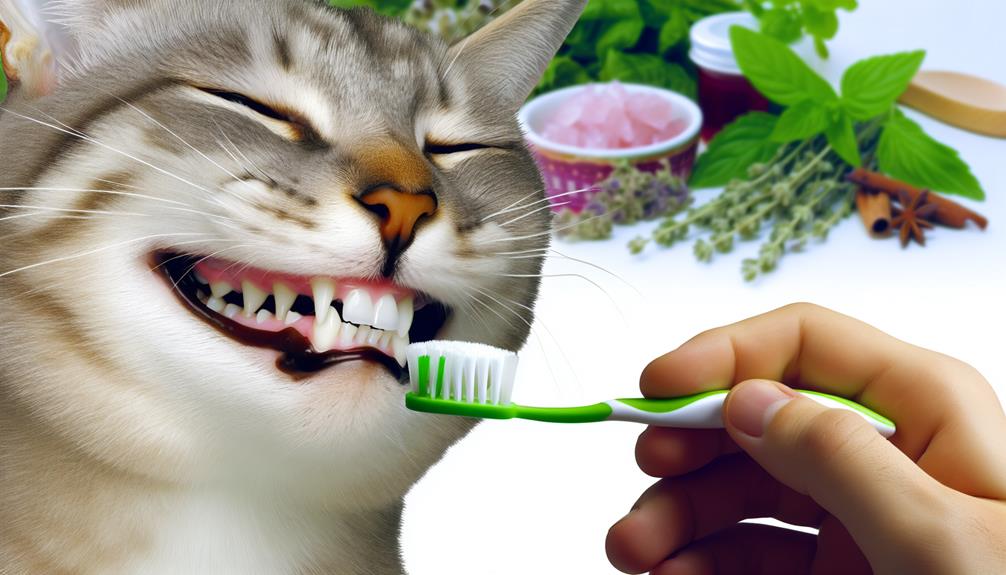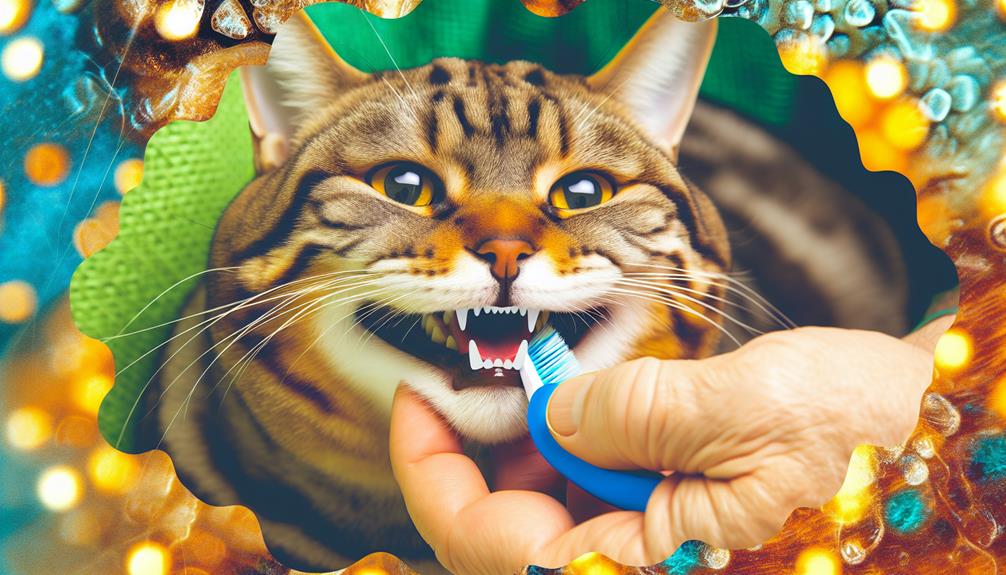Hey there, 7th graders! Today, I want to talk to you about something that's not just important for us humans, but also for our furry friends – dental care for cats! Did you know that just like us, cats can have dental problems too? Yup, they can get plaque buildup, gum disease, and even tooth decay! But don't worry, I've got some tips to help keep your cat's teeth in tip-top shape! First, regular brushing is super important. Just like we brush our teeth, cats need their teeth brushed too. Second, dental-friendly treats and toys can help keep their teeth clean. And finally, there's a secret tip that you'll want to stick around for. So let's get started and keep those kitty teeth healthy and clean!
Key Takeaways
Key Takeaways:
- Regularly brushing your cat's teeth helps prevent dental diseases and keeps their teeth strong.
- Offering dental-friendly treats and toys can also contribute to your cat's oral health.
- Scheduling regular check-ups with a veterinarian ensures your cat's dental well-being and helps catch any issues early on.
These tips will help you take care of your cat's oral health, ensuring they have a happy and healthy life.
Brushing Your Cat's Teeth
How to Keep Your Cat's Teeth Clean and Healthy
Did you know that cats can have dental problems just like humans? Plaque buildup, tartar, and gum disease can be a real pain for them. But don't worry, there's a simple solution – brushing your cat's teeth! By doing this regularly, you can prevent these issues and make sure your furry friend has great dental hygiene.
Here's what you need to know:
- Use cat toothpaste: Regular toothpaste can be harmful to cats because of the fluoride and other ingredients. So make sure to get toothpaste specifically made for cats. It's safe for them to swallow.
- Introduce the toothpaste: Let your cat taste the toothpaste by letting them lick a little from your finger or a toothbrush. This helps them get used to the flavor.
- Start brushing gently: Once your cat is comfortable with the toothpaste, you can start brushing. Use a toothbrush or a finger brush designed for cats. Brush in gentle circular motions along the gumline.
- Frequency matters: It's recommended to brush your cat's teeth at least two to three times a week. But if your cat has dental problems or is prone to them, daily brushing may be necessary.
- Annual check-ups: Along with regular brushing, it's important to take your cat for dental check-ups once a year. This helps catch any potential issues early on and keeps their teeth in tip-top shape.
Providing Dental-Friendly Treats and Toys
Discover the Secret to Keeping Your Cat's Teeth Purr-fectly Healthy!
Did you know that providing dental treats and toys for your cat can actually improve their oral health? It's true! Just like humans, cats need to take care of their teeth too. But not all treats and toys are created equal. Here's what you need to know:
- Dental treats are a great way to keep your cat's teeth clean and healthy. Look for treats that have a crunchy texture or are specially formulated to reduce tartar buildup. These treats often contain ingredients that help remove plaque and freshen breath.
- Not all dental treats are effective, so it's important to consult your veterinarian for recommendations. They can help you find the best treats for your cat's specific needs.
- Dental toys are another fantastic way to promote oral health. Chew toys and interactive toys that require biting and chewing can help remove plaque and tartar from your cat's teeth.
- When choosing dental toys, make sure they are made from safe and durable materials. Also, consider your cat's size and chewing habits to ensure the toy is appropriate.
- Interactive toys that dispense treats can provide mental stimulation while promoting dental health. It's like a fun game for your cat!
Regular Dental Check-Ups and Cleanings
Why Do Cats Need Regular Dental Check-Ups and Cleanings?
Did you know that just like humans, cats can have dental problems too? That's right! Cats can get plaque buildup, gum disease, and even tooth decay. Ouch! But don't worry, there are ways to prevent these issues and keep your cat's teeth healthy and strong.
Here's why regular dental check-ups and cleanings are important for your furry friend:
- Catching problems early: When you take your cat for a dental check-up, the veterinarian can spot any dental issues before they become big problems. They'll check your cat's teeth, gums, and mouth for signs of disease or abnormalities. By catching these problems early, you can prevent your cat from experiencing pain and discomfort later on.
- Removing plaque and tartar: During a dental cleaning, the vet will clean your cat's teeth to remove plaque and tartar buildup. This is important because plaque and tartar can cause gum disease and tooth decay. By getting rid of them, you're helping to keep your cat's teeth healthy and strong.
- Establishing a dental care routine: In addition to professional cleanings, it's important to take care of your cat's teeth at home too. Your veterinarian can show you how to brush your cat's teeth using a special cat toothbrush and toothpaste. By brushing regularly, you can help prevent plaque buildup and keep your cat's breath fresh.
Frequently Asked Questions
What Are the Common Signs of Dental Problems in Cats?
Frequently Asked Questions:
Q: How important are dental check-ups for cats?
A: Dental check-ups for cats are super important because they help identify and take care of dental problems. Just like humans, cats can get toothaches and cavities, so regular check-ups help catch these issues early.
Q: What are some signs that my cat might have dental problems?
A: If your cat has bad breath, trouble eating, drools a lot, or has red and swollen gums, these could be signs of dental problems. It's important to pay attention to these signs and take your cat to the vet if you notice them.
Q: How can I prevent dental problems in my cat?
A: There are a few things you can do to prevent dental problems in your cat. First, you can brush their teeth regularly with cat toothpaste. You can also give them dental diets and dental treats that help keep their teeth clean. These preventive measures can help keep your cat's mouth healthy.
Q: Why is it important to take care of my cat's oral health?
A: Taking care of your cat's oral health is important because dental problems can be painful for them. If left untreated, dental issues can lead to infections and other health problems. By keeping their mouth healthy, you're helping them live a happier and healthier life.
Q: Can I do anything at home to help maintain my cat's oral health?
A: Yes, there are things you can do at home to help maintain your cat's oral health. Regularly brushing their teeth, giving them dental treats, and feeding them dental diets are all things you can do to keep their teeth clean. Just make sure to use products that are specifically designed for cats.
Q: What should I do if I notice any dental problems in my cat?
A: If you notice any signs of dental problems in your cat, like bad breath or swollen gums, it's important to take them to the vet. The vet will be able to examine their mouth and provide the necessary treatment. It's always better to catch and treat dental problems early, so don't hesitate to seek professional help.
Can I Use Human Toothpaste to Brush My Cat's Teeth?
Frequently Asked Questions (FAQs) about Brushing Your Cat's Teeth
Q: Can I use the same toothpaste for my cat that I use for myself?
A: It's best not to. Human toothpaste can have harmful ingredients like fluoride and xylitol, which can be toxic to cats. It's safer to use toothpaste made specifically for cats.
Q: Why do cats need their teeth brushed?
A: Just like humans, cats can develop dental problems like tartar and gum disease. Brushing their teeth helps prevent these issues and keeps their breath fresh.
Q: How often should I brush my cat's teeth?
A: Ideally, you should brush your cat's teeth every day. But even a few times a week can make a difference in maintaining their dental health.
Q: How do I start brushing my cat's teeth?
A: Start by getting your cat used to having their mouth touched. Then, introduce them to the taste of the cat toothpaste. Gradually, start brushing a few teeth at a time until your cat is comfortable with the process.
Q: What if my cat doesn't like having their teeth brushed?
A: Some cats may not enjoy teeth brushing at first. Be patient and try different techniques, like using a finger brush or dental treats. You can also consult your veterinarian for additional tips and advice.
Q: Can I use a regular toothbrush for my cat's teeth?
A: It's best to use a toothbrush specifically designed for cats. They have softer bristles and a smaller size, which makes it easier to reach all areas of your cat's mouth.
Q: Are there any alternatives to brushing my cat's teeth?
A: While brushing is the most effective method, there are also dental rinses, oral gels, and dental treats available that can help maintain your cat's dental health. These can be used as alternatives or in combination with brushing.
How Often Should I Brush My Cat's Teeth?
Frequently Asked Questions (FAQ) about Brushing Your Cat's Teeth:
Q: How often should I brush my cat's teeth?
A: It's best to brush your cat's teeth every day or at least three times a week. Regular brushing helps prevent problems like plaque buildup, tartar formation, and gum disease.
Q: Why is brushing my cat's teeth important?
A: Brushing your cat's teeth helps keep their mouth healthy. It prevents things like bad breath, tooth decay, and painful gum infections. Plus, it saves you money on expensive vet bills!
Q: How do I brush my cat's teeth?
A: Start by getting a special cat toothbrush and toothpaste (not the human kind!). Gently introduce the toothbrush to your cat's mouth, using small circular motions. Be patient and take it slow, so your cat gets used to the process.
Q: My cat hates getting their teeth brushed. What should I do?
A: It's common for cats to not like tooth brushing at first. Try making it a positive experience by giving them treats or praise after each brushing session. You can also use dental treats or toys to help keep their teeth clean.
Q: Can't I just give my cat dental treats instead of brushing?
A: Dental treats can be helpful, but they're not a substitute for brushing. Brushing removes plaque and tartar in a way treats can't. Think of dental treats as a bonus, but make sure to still brush your cat's teeth regularly.
Q: What if my cat refuses to let me brush their teeth?
A: If your cat really doesn't want their teeth brushed, it's best to consult with your vet. They can recommend alternative options like dental gels or wipes that can help keep your cat's teeth clean.
Are There Any Alternative Methods to Brushing a Cat's Teeth?
Frequently Asked Questions about Taking Care of Your Cat's Teeth:
Q: Do I have to brush my cat's teeth?
A: While brushing your cat's teeth is the best way to keep them clean, there are alternative methods available. You can try dental chews, treats, and water additives made specifically for cats. These can help reduce plaque and keep your cat's teeth healthy.
Q: Can I make my own toothpaste for my cat?
A: Yes, you can! Homemade toothpaste for cats can be a great alternative if your cat doesn't like the taste of regular toothpaste. You can mix baking soda with water to make a paste and gently rub it on your cat's teeth using your finger or a soft toothbrush.
Q: What are dental chews and treats?
A: Dental chews and treats are specially designed to help clean your cat's teeth while they chew on them. These treats have a texture that helps remove plaque and tartar as your cat bites and chews on them. They can be a fun and tasty way to keep your cat's teeth clean.
Q: What are water additives for dental care?
A: Water additives are products that you can add to your cat's drinking water to help improve their oral health. These additives contain ingredients that can help reduce plaque and freshen your cat's breath. It's an easy way to promote dental hygiene without brushing.
Q: Can these alternatives replace brushing completely?
A: While these alternatives can help maintain your cat's oral health, brushing is still the best way to keep their teeth clean. Regular brushing helps remove plaque and prevent dental problems. If your cat refuses to let you brush their teeth, using these alternatives can still make a difference until you can introduce brushing gradually.
What Are Some Natural Remedies or Supplements That Can Help Improve My Cat's Dental Health?
Frequently Asked Questions about Natural Remedies for Cat's Dental Health
*Q: What are natural remedies for my cat's dental health?*
A: Natural remedies for your cat's dental health include things like giving them dental treats or toys to chew on. These help clean their teeth and keep them healthy. You can also feed them a balanced diet that promotes dental health. Some herbal supplements like catnip or mint can also be helpful.
*Q: How can dental treats or toys improve my cat's dental health?*
A: Dental treats or toys are designed to help clean your cat's teeth as they chew on them. They have special textures that can help remove plaque and tartar from their teeth. Chewing on these treats or toys can also help strengthen their gums and keep their breath fresh.
*Q: Can a balanced diet help improve my cat's dental health?*
A: Absolutely! Feeding your cat a balanced diet that promotes dental health can make a big difference. Some cat foods are specially formulated to help keep their teeth clean and prevent dental issues. Look for ones that have ingredients like crunchy kibbles or enzymes that can help reduce plaque buildup.
*Q: Are herbal supplements like catnip or mint beneficial for my cat's dental health?*
A: Yes, they can be! Catnip and mint are herbs that have natural properties that can help freshen your cat's breath and promote good oral hygiene. Some cats enjoy chewing on catnip or mint leaves, which can help keep their teeth clean. Just make sure to use these supplements in moderation and consult with your veterinarian.
Conclusion
To keep your cat healthy and happy, remember these three dental care tips: brush their teeth regularly, offer dental-friendly treats and toys, and schedule regular check-ups. These practices will protect your cat from dental diseases and ensure they have strong teeth for life. Take care of your feline friend's oral health—it's worth it! Share your thoughts or learn more about cat dental care. Let's keep those pearly whites shining!




